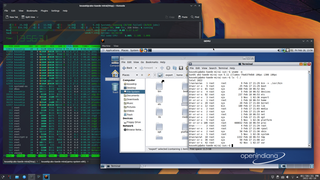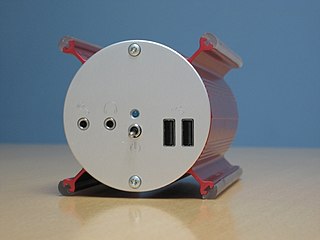
In computing, BIOS is firmware used to provide runtime services for operating systems and programs and to perform hardware initialization during the booting process. The firmware comes pre-installed on the computer's motherboard.
In computing, cross-platform software is computer software that is designed to work in several computing platforms. Some cross-platform software requires a separate build for each platform, but some can be directly run on any platform without special preparation, being written in an interpreted language or compiled to portable bytecode for which the interpreters or run-time packages are common or standard components of all supported platforms.

Open Firmware is a standard defining the interfaces of a computer firmware system, formerly endorsed by the Institute of Electrical and Electronics Engineers (IEEE). It originated at Sun Microsystems where it was known as OpenBoot, and has been used by multiple vendors including Sun, Apple, IBM and ARM.

x86-64 is a 64-bit version of the x86 instruction set, first announced in 1999. It introduced two new modes of operation, 64-bit mode and compatibility mode, along with a new 4-level paging mode.

Unified Extensible Firmware Interface is a specification that defines an architecture for the platform firmware used for booting a computer's hardware and its interface for interaction with the operating system. Examples of firmware that implement the specification are AMI Aptio, Phoenix SecureCore, TianoCore EDK II, InsydeH2O.

QEMU is a free and open-source emulator. It emulates a computer's processor through dynamic binary translation and provides a set of different hardware and device models for the machine, enabling it to run a variety of guest operating systems. It can interoperate with Kernel-based Virtual Machine (KVM) to run virtual machines at near-native speed. QEMU can also do emulation for user-level processes, allowing applications compiled for one processor architecture to run on another.

coreboot, formerly known as LinuxBIOS, is a software project aimed at replacing proprietary firmware found in most computers with a lightweight firmware designed to perform only the minimum number of tasks necessary to load and run a modern 32-bit or 64-bit operating system.

A free and open-source graphics device driver is a software stack which controls computer-graphics hardware and supports graphics-rendering application programming interfaces (APIs) and is released under a free and open-source software license. Graphics device drivers are written for specific hardware to work within a specific operating system kernel and to support a range of APIs used by applications to access the graphics hardware. They may also control output to the display if the display driver is part of the graphics hardware. Most free and open-source graphics device drivers are developed by the Mesa project. The driver is made up of a compiler, a rendering API, and software which manages access to the graphics hardware.
Advanced Configuration and Power Interface (ACPI) is an open standard that operating systems can use to discover and configure computer hardware components, to perform power management, auto configuration, and status monitoring. It was first released in December 1996. ACPI aims to replace Advanced Power Management (APM), the MultiProcessor Specification, and the Plug and Play BIOS (PnP) Specification. ACPI brings power management under the control of the operating system, as opposed to the previous BIOS-centric system that relied on platform-specific firmware to determine power management and configuration policies. The specification is central to the Operating System-directed configuration and Power Management (OSPM) system. ACPI defines hardware abstraction interfaces between the device's firmware, the computer hardware components, and the operating systems.

The Apple–Intel architecture, or Mactel, is an unofficial name used for Macintosh personal computers developed and manufactured by Apple Inc. that use Intel x86 processors, rather than the PowerPC and Motorola 68000 ("68k") series processors used in their predecessors or the ARM-based Apple silicon SoCs used in their successors. As Apple changed the architecture of its products, they changed the firmware from the Open Firmware used on PowerPC-based Macs to the Intel-designed Extensible Firmware Interface (EFI). With the change in processor architecture to x86, Macs gained the ability to boot into x86-native operating systems, while Intel VT-x brought near-native virtualization with macOS as the host OS.

Das U-Boot is an open-source boot loader used in embedded devices to perform various low-level hardware initialization tasks and boot the device's operating system kernel. It is available for a number of computer architectures, including M68000, ARM, Blackfin, MicroBlaze, AArch64, MIPS, Nios II, SuperH, PPC, RISC-V and x86.
In the context of free and open-source software, proprietary software only available as a binary executable is referred to as a blob or binary blob. The term usually refers to a device driver module loaded into the kernel of an open-source operating system, and is sometimes also applied to code running outside the kernel, such as system firmware images, microcode updates, or userland programs. The term blob was first used in database management systems to describe a collection of binary data stored as a single entity.

Kernel-based Virtual Machine (KVM) is a free and open-source virtualization module in the Linux kernel that allows the kernel to function as a hypervisor. It was merged into the mainline Linux kernel in version 2.6.20, which was released on February 5, 2007. KVM requires a processor with hardware virtualization extensions, such as Intel VT or AMD-V. KVM has also been ported to other operating systems such as FreeBSD and illumos in the form of loadable kernel modules.
The Linux booting process involves multiple stages and is in many ways similar to the BSD and other Unix-style boot processes, from which it derives. Although the Linux booting process depends very much on the computer architecture, those architectures share similar stages and software components, including system startup, bootloader execution, loading and startup of a Linux kernel image, and execution of various startup scripts and daemons. Those are grouped into 4 steps: system startup, bootloader stage, kernel stage, and init process. When a Linux system is powered up or reset, its processor will execute a specific firmware/program for system initialization, such as the power-on self-test, invoking the reset vector to start a program at a known address in flash/ROM, then load the bootloader into RAM for later execution. In IBM PC–compatible personal computers (PCs), this firmware/program is either a BIOS or a UEFI monitor, and is stored in the mainboard. In embedded Linux systems, this firmware/program is called boot ROM. After being loaded into RAM, the bootloader will execute to load the second-stage bootloader. The second-stage bootloader will load the kernel image into memory, decompress and initialize it, and then pass control to this kernel image. The second-stage bootloader also performs several operation on the system such as system hardware check, mounting the root device, loading the necessary kernel modules, etc. Finally, the first user-space process starts, and other high-level system initializations are performed.

ThinCan is a thin client manufactured by Estonian electronic design start-up Artec Group. The ThinCan remained relatively unknown outside Estonia until 2006, when a recent ThinCan iteration was selected as the hardware base for the Linutop, a network appliance that greatly stimulated the market for lightweight computing platforms. The ThinCan was also commercialized by SmartLink under the Revnetek brand name.
Mbed TLS is an implementation of the TLS and SSL protocols and the respective cryptographic algorithms and support code required. It is distributed under the Apache License version 2.0. Stated on the website is that Mbed TLS aims to be "easy to understand, use, integrate and expand".

SeaBIOS is an open-source implementation of an x86 BIOS, serving as a freely available firmware for x86 systems. Aiming for compatibility, it supports standard BIOS features and calling interfaces that are implemented by a typical proprietary x86 BIOS. SeaBIOS can either run on bare hardware as a coreboot payload, or can be used directly in emulators such as QEMU and Bochs.

XigmaNAS is an open-source Network-attached storage (NAS) server software with a dedicated management web interface. It is a continuation of the original FreeNAS code, which was developed between 2005 and late 2011. It was released under the name NAS4Free on 22 March 2012. The name was changed to XigmaNAS in July 2018. On SourceForge, it was elected "'Community Choice' Project of the Month" twice, in August 2015 and March 2017.
The OpenPOWER Foundation is a collaboration around Power ISA-based products initiated by IBM and announced as the "OpenPOWER Consortium" on August 6, 2013. IBM's focus is to open up technology surrounding their Power Architecture offerings, such as processor specifications, firmware, and software with a liberal license, and will be using a collaborative development model with their partners.













